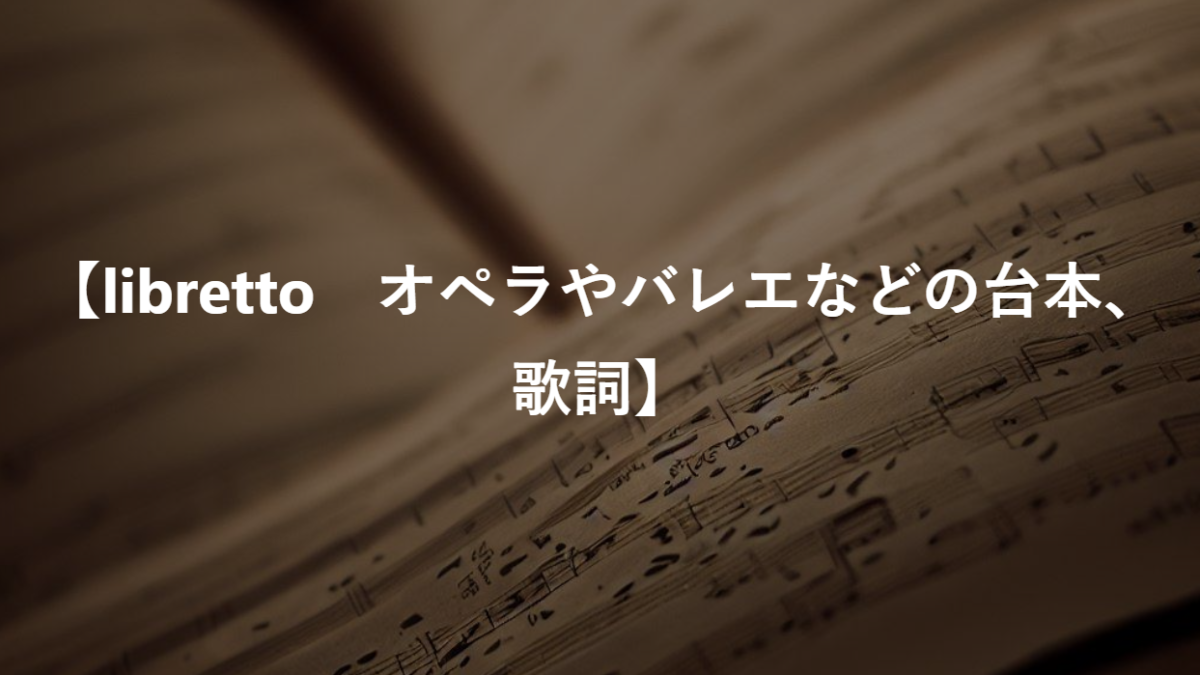【libretto オペラやバレエなどの台本、歌詞】という単語の語源とか由来を知っていますか?
「libretto」はイタリア語で、「小さな本」を意味する「libretto」から来ています。この用語は、オペラ、バレエ、オラトリオなどの音楽劇のための台本や歌詞を指すために使われるようになりました。元々「libro」がイタリア語で「本」を意味し、「libretto」はその縮小形です。音楽劇が発展する過程で、物語や歌詞が書かれた小さな本が観客や演者に配られるようになり、これらの台本が「libretto」と呼ばれるようになりました。この用語は17世紀のイタリアでオペラが隆盛を極めた時期に広まり、やがて国際的に用いられるようになりました。
The term “libretto” originates from the Italian word “libretto,” which means “little book.” This term has come to refer to the script or lyrics for musical dramas such as operas, ballets, and oratorios. Originally, “libro” means “book” in Italian, and “libretto” is its diminutive form. As musical dramas evolved, small books containing the story and lyrics were distributed to audiences and performers, and these scripts were called “libretto.” This term became widespread during the flourishing of opera in Italy in the 17th century and eventually was adopted internationally.
この単語の類義語・反対語を教えてください。
類義語
- Script – 脚本。一般に劇や映画の台本を指しますが、音楽劇の文脈ではlibrettoと同義で使われることがあります。
- Score – 楽譜。音楽の記譜法で書かれた作品の全体を指しますが、歌詞だけでなく音楽も含むため、librettoと関連が深いです。
- Text – テキスト。オペラやバレエの台本の言葉部分を指す場合に使用されます。
- Book – 本。ミュージカルなどで、台詞やストーリーを含む部分を指すのに使われることがあります。
反対語
Librettoの直接的な反対語は存在しませんが、librettoが具体的な物語や歌詞を提供するものであることを考えると、以下の概念は対照的な要素を持っていると言えます。
- Improvisation (即興) – あらかじめ用意された台本や楽譜に依存せず、演者がその場で創造する芸術形態。
- Instrumental music (器楽曲) – 歌詞を伴わない、楽器のみで演奏される音楽。Librettoが歌詞を中心とするのに対し、器楽曲は音楽のみを提供します。
- Silent film (無声映画) – 台詞や歌詞がなく、映像と音楽のみで物語を伝える映画形式。台詞や歌詞に頼らない表現方法です。
この単語に似た単語で間違いやすい単語はありますか?
- Librarian(図書館員)- 「librarian」という単語は「libretto」と音が似ているため、混同されることがあります。しかし、「librarian」は図書館で本や情報資源を管理する専門家を指します。
- Liberate(解放する)- 「liberate」という単語も「libretto」と音が似ているため、混同されることがあります。しかし、「liberate」は人々を自由にする、束縛から解放するといった意味を持ちます。
- Library(図書館)- 「library」という単語も「libretto」と音が似ているため、混同されることがあります。しかし、「library」は本や資料が保管されている場所であり、図書館を指します。
この単語にまつわるエピソードなどはありますか?
例えば、オペラ「フィガロの結婚」のlibrettoは、ピエール・ボーマルシェの戯曲「フィガロの結婚」に基づいてロレンツォ・ダ・ポンテによって書かれ、ヴォルフガング・アマデウス・モーツァルトが作曲しました。この作品は、社会的な階級の境界を超えた愛と策略を描いており、その洗練された台本と魅力的な音楽で広く称賛されています。
また、ジュゼッペ・ヴェルディのオペラ「リゴレット」のlibrettoは、ヴィクトル・ユーゴーの戯曲「王は楽しむ」に触発されたもので、フランチェスコ・マリア・ピアーヴェが執筆しました。このlibrettoは、強力ながらも悲劇的なキャラクター、リゴレットとその娘ジルダの物語を通じて、愛、裏切り、復讐のテーマを探求しています。
これらの例は、librettoがオペラやバレエの作品において、単に歌詞を提供するだけでなく、物語の展開、キャラクターの深化、感情の表現といった重要な役割を果たしていることを示しています。音楽とともに、librettoはこれらの作品の成功に不可欠な要素であり、観客に強い感情的な体験を提供します。
There are many notable episodes related to “libretto,” as numerous famous librettos have played a crucial role in the world of opera and ballet. For instance, the libretto for the opera “The Marriage of Figaro” was written by Lorenzo Da Ponte, based on the play “The Marriage of Figaro” by Pierre Beaumarchais, with music composed by Wolfgang Amadeus Mozart. This work, which depicts love and intrigue across social classes, is widely praised for its sophisticated script and captivating music.
Another example is Giuseppe Verdi’s opera “Rigoletto,” whose libretto was inspired by Victor Hugo’s play “Le Roi s’amuse” and written by Francesco Maria Piave. This libretto explores themes of love, betrayal, and revenge through the story of the powerful yet tragic character Rigoletto and his daughter Gilda.
These examples demonstrate that librettos in operas and ballets serve not merely to provide lyrics but also play a significant role in developing the plot, deepening characters, and expressing emotions. Along with music, librettos are an essential element of these works’ success, offering audiences a profound emotional experience.
例文をいくつか教えてください
The composer collaborated with a talented playwright to create a captivating libretto for the new opera.
(作曲家は才能ある劇作家と協力して、新しいオペラの魅力的な台本を作り上げました。)
The ballet company commissioned a renowned poet to write the libretto for their upcoming production.
(バレエカンパニーは有名な詩人に、次回の公演のための台本を執筆してもらいました。)
The opera singer studied the libretto thoroughly to fully grasp the character’s motivations and emotions.
(オペラ歌手は登場人物の動機や感情を完全に理解するため、台本を徹底的に勉強しました。)
The libretto of the ballet beautifully captured the essence of the classic fairy tale, enchanting the audience with its poetic language.
(バレエの台本は古典的な童話の本質を美しく表現し、その詩的な言葉で観客を魅了しました。)
The opera company decided to make changes to the libretto in order to modernize the story and make it more relatable to contemporary audiences.
(オペラカンパニーは、物語を現代的にし、現代の観客により共感を持ってもらうために、台本に変更を加えることを決めました。)
【libretto オペラやバレエなどの台本、歌詞】のコロケーション
- Opera libretto (オペラの台本): オペラの物語や登場人物のセリフ、歌詞を含む文書。オペラの制作において重要な役割を果たします。
- Ballet libretto (バレエの台本): バレエの演出に用いられる物語や構成を記した台本。バレエの振り付けや演出の基礎となります。
- Write a libretto (台本を書く): オペラやバレエのために特定の物語や歌詞を作成する行為。作曲家や演出家と密接に協力することが多いです。
- Libretto adaptation (台本の改編): 既存の文学作品や劇をオペラやバレエの台本に改編すること。物語の要素を音楽劇に適した形に変換します。
- Commission a libretto (台本を依頼する): 作曲家や劇場が、特定のオペラやバレエのために台本家に台本の作成を依頼すること。
- Libretto and score (台本と楽譜): オペラやバレエの台本と、それに合わせた楽譜。両者は作品の演出において不可欠な要素です。
- Historical libretto (歴史的台本): 歴史上の出来事や人物を題材にしたオペラやバレエの台本。歴史的な背景を芸術的に表現します。
「Libretto」という言葉は、オペラやバレエなどの音楽劇で用いられる台本や歌詞を指します。この用語は、作品の物語、キャラクターのセリフ、歌詞などを含む重要な文書であり、作曲家や演出家によって作品の骨格となる部分を形成します。特に「Opera libretto」は、オペラの核となる物語や歌詞を提供し、「Ballet libretto」はバレエの演出や振り付けの基本となります。
「Libretto」の作成は、「Write a libretto」という形で表され、これは特定の物語やテーマを音楽劇の形式に合わせて書き起こすクリエイティブなプロセスです。また、「Libretto adaptation」では、既存の文学作品や劇が新たなオペラやバレエの台本に変換され、新しい芸術作品が生まれます。
作品の発注者が「Commission a libretto」として台本家に作成を依頼することもあり、これによってオリジナルのオペラやバレエが誕生します。「Libretto and score」は、台本とそれに対応する楽譜が一体となって作品を構成し、両者は演出において不可分の関係にあります。
また、「Historical libretto」は、歴史的な出来事や人物を題材とした作品で、過去のエピソードを通じて観客に感動や教訓を伝えます。
これらのコロケーションを通じて、「libretto」が音楽劇における物語構築、キャラクター開発、感情伝達のためにいかに重要であるかが明らかになります。librettoは、音楽と共に作品の深みを増し、観客に豊かな体験を提供するための鍵となる要素です。
The term “libretto” refers to the script or lyrics used in musical dramas such as operas and ballets. This term encompasses the essential documents containing the story, dialogue, and lyrics, forming the skeleton of the work by composers and directors. Specifically, “Opera libretto” provides the core story and lyrics for operas, while “Ballet libretto” serves as the foundation for ballet productions and choreography.
The creation of a libretto, expressed as “Write a libretto,” is a creative process of adapting specific stories or themes to fit the format of a musical drama. Additionally, “Libretto adaptation” involves transforming existing literary works or plays into new librettos for operas or ballets, giving birth to new artistic creations.
Commissioners may “Commission a libretto” from librettists, leading to the creation of original operas or ballets. “Libretto and score” are inseparable components of a production, with the libretto and corresponding musical score jointly shaping the performance.
Furthermore, “Historical libretto” focuses on works based on historical events or figures, conveying emotions and lessons through past episodes to the audience.
These collocations illustrate the vital role of the libretto in constructing narratives, developing characters, and conveying emotions in musical dramas. Librettos, alongside music, are key elements that enhance the depth of the work and provide rich experiences to the audience.
librettoを使った文法問題
- The composer spent months crafting the _____ for his new opera, meticulously choosing each word and phrase to convey the story’s emotional depth.
- (A) librettist
- (B) librettos
- (C) libretto
- (D) libretti
解答と解説: (C) libretto
解説: 空欄には、作曲家が新しいオペラのために「台本」を作成したという意味の名詞が入ります。librettoは「台本」という意味の単数形名詞です。
- The opera singer studied the _____ carefully, memorizing not only the lyrics but also the nuances of the character’s emotions.
- (A) librettist
- (B) librettos
- (C) libretto
- (D) libretti
解答と解説: (C) libretto
解説: オペラ歌手が注意深く「台本」を研究したという文脈なので、単数形のlibrettoが適切です。
- The _____ for the musical was written by a renowned playwright, known for his witty dialogue and clever lyrics.
- (A) librettist
- (B) librettos
- (C) libretto
- (D) libretti
解答と解説: (C) libretto
解説: 空欄には、ミュージカルの「台本」を書いたという意味の名詞が入ります。librettoは「台本」という意味の単数形名詞です。
- The director worked closely with the _____, making adjustments to the text to enhance the dramatic impact of the performance.
- (A) librettist
- (B) librettos
- (C) libretto
- (D) libretti
解答と解説: (A) librettist
解説: 空欄には、一緒に仕事をした「台本作家」という意味の名詞が入ります。librettistは「台本作家」という意味の名詞です。
- The library’s collection includes a wide range of _____, from classic operas to contemporary musicals.
- (A) librettist
- (B) librettos
- (C) libretto
- (D) libretti
解答と解説: (D) libretti
解説: 空欄には、図書館のコレクションに含まれる様々な「台本」という意味の名詞の複数形が入ります。librettiは「台本」という意味の名詞の複数形です。

